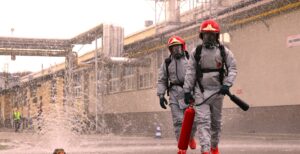
Pasadena Bio Collaborative Incubator – Life Science in Motion
It’s always a win-win situation when dedicated public investments in innovation drive both healthcare and economic development. Such is the case with the Pasadena Bio Collaborative Incubator (PBC), which launched in 2004 as a center where scientists could build their ideas into companies, and the region’s students could train for future careers in life sciences. The project is a partner of the LA County Bioscience Initiative.
Innovation for Economics Sake
The PBC’s nexus of scientific and economic interests solves myriad challenges:
It provides a reasonably priced, well-equipped laboratory space for researchers to explore the development of new science-based products and services.
It facilitates connections with the investors needed to fund the research, …
… and the financial resources to build businesses based on those innovations.
It provides a hands-on experience for high school and community college students interested in pursuing healthcare careers, and
It offers the capacity to generate the jobs and careers that those (eventual) graduates will fill.
The past 16 years have seen the initial idea mature. Since 2004 the PBC has expanded from 500 sq ft into a 12,600 square foot facility. Conceived in partnership with Caltech, the Huntington Medical Research Institutes, and the California State University system, and Oak Crest Institute of Science, the initial funding came from the California State Assembly.
Two Fronts: One Focus

The structure of Pasadena Bio is two-fold:
to provide researchers with the lab space and equipment they need to bring their ideas forward – PBC Wetlab, and
to support workforce development by connecting regional industrial and educational resources to hands-on training for employment – PBC Training.
The Pasadena Bio Wetlab (PBC Wetlab)
Since its 2004 inception, the PBC Wetlab has nurtured more than 70 life science research projects. Currently, it houses over 30 tenants. Half of the companies that have left PBC did so to become larger entities. Those successes are built on the foresight and strategic planning of the facility’s leadership and the strategic partnerships they’ve forged with like-minded organizations in and around the LA Basin. The current laboratory director, Dr. Wendie Johnston (involved with the Collaborative since the early 2000s), has a career-long association with Pasadena City College and has helped many science students become full-fledged scientists. She oversees the Wetlab’s many operations and works with the entire PBC team to assist tenants in pursuit of their research:
The PBC Wetlab offers its current 30+ tenants access to mentors, use of the shared use equipment, and donated supplies.
It works with experts from various fields, who provide the tenants with information, support, and insights on everything from engineering prototypes to legal protections to developing business plans.
The PBC Wetlab also is a repository of a variety of scientific research tools and machines. Tenants’ access to this equipment means they don’t have to invest their project funds on expensive equipment. Having access to shared use and pay-for-use equipment allows the start-up to conserve resources.
Further, the PBC Wetlab works with local trade associations SoCalBio and BioCom, which offer PBC tenants discounted vendor options.
Current tenants are working on advances in cellular reprogramming, cancer drugs that inhibit drug resistance, and (especially poignant in today’s world) vaccines. In its short life-span, the Pasadena Bio Wetlab has contributed to the development of innovative new drugs and medical devices that now offer relief from pain, newfound mobility, and life-saving therapies.
Pasadena Bio Training (PBC Training)
Studying in a lab is vastly different from observing healthcare and medical practices in the field. The PBC Training division engages directly with local high school and community college students to provide a real-life work experience in a real-life science lab. Additionally, through association with the Los Angeles/Orange County Biotechnology Center, PBC Training collaborates with the region’s community colleges to align their coursework to match the bio-science industry’s employment needs.
For high schools, PBC Training’s connections are unique. PBC provides regional high school educators with access to the Amgen Biotech Experience (ABE): professional development opportunities for teachers coupled with research-grade equipment and lessons to use in the classroom. Teachers use the materials and equipment to bring high-tech science to their local high school classrooms. High school students are included outside the school, too. The ‘kits’ that travel to the schools are returned to the PBC lab (one of four Amgen distribution centers in the LA area), where a cadre of students clean and prep them to be shipped to the next school. These lucky learners experience not only the lab’s activities but also the ‘business’ of working in a lab: taking measurements, checking quality controls, and producing production sheets.
The PBC Training also includes college students by offering internships that involve interaction with PBC’s tenants. Interns and pre-apprentices spend 200 hours throughout the summer, working toward the milestones needed to further their bioscience career goals. PBC Training teaches these “employability milestones,” which include the skill sets necessary to gain employment:
Core Technical Competencies for Lab Personnel, which involve understanding the terminology, concepts, and operations of the lab, as well as how to perform, document, and preserve the records of fundamental lab techniques and procedures.
Core Cultural Competencies for Lab Personnel, which include soft skills for working in teams, communications, and maintaining integrity.
Hands-on skills training covers foundational lab activities, such as how to use the various devices and machines, how to design, manage, and perform experiments, and the fundamentals of protein chemistry and nucleic acid chemistry.
Much of PBC Training’s work is based on the data and metrics driving the bioscience field in the LA region. Its many reports provide insights into the supply and demand for middle-skill workers, appropriate curricula for ensuring workplace readiness, and even a listing of job titles for laboratory workers.
Economic Development

Photo: South Bay Workforce Investment Board
PBC provides training for its tenants, too, not on their scientific endeavors but on building the businesses that will take their new product or service into the wider community. On the economic development side of the PBC is Dr. Robert (Bud) Bishop, who took over the helm of PBC three years ago. Dr. Bishop brings with him all the lessons learned during a long career in the corporate healthcare field. PBC is flourishing in part because of his deep understanding of the industry as a whole, his personal experience, and his connections in the health care industry.
The PBC is looking forward to a robust and productive future for itself and its tenants. With Dr.’s Bishop and Johnston in charge, there’s no reason to believe it won’t continue its long and successful winning streak.


